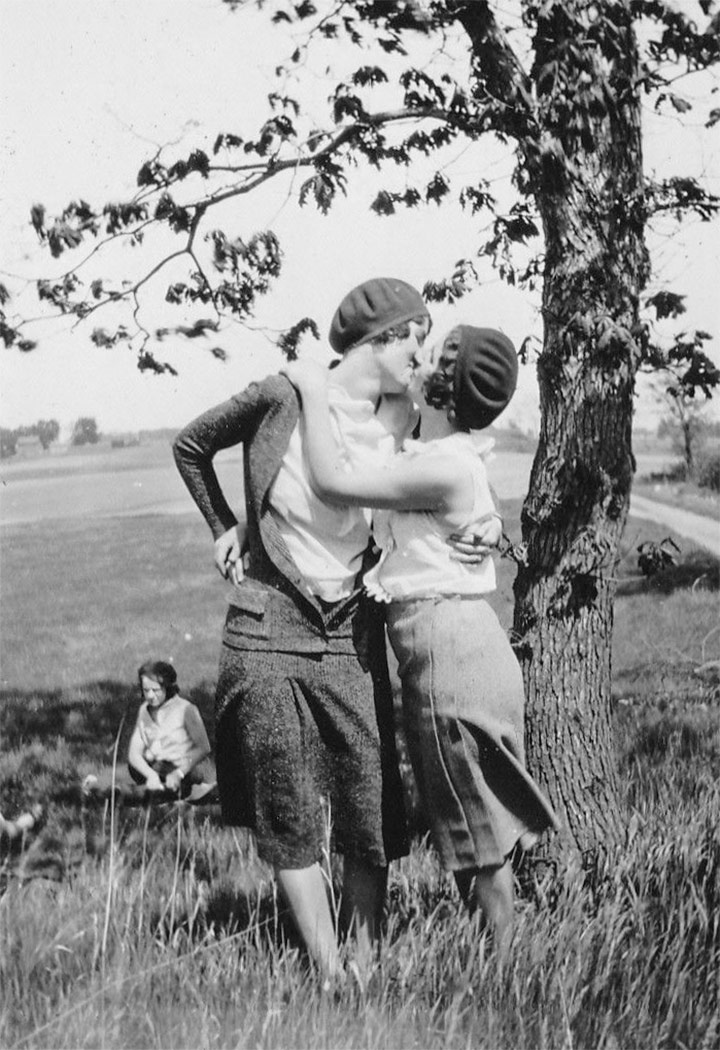
Two women kissing next to a tree, c. 1930 | Wikimedia Commons | Public domain
In recent years, the converstation around love seems to be framed in politcal or sociological terms. Despite this, we all still feel a deep longing for love and passion. So what is it that is escaping us in our statistical, rational and scientific studies?
Nowadays, if you cry “love,” the answer you will get is “Eva Illouz.” It’s true. That’s the way it is with trends – there’s no need to get upset about it. They take all our knowledge and turn it into a compact, impermeable mass that leaves out so many things. Then a very specific lexicon is created and, suddenly, everyone speaks the same language (“the end of love,” “cold intimacy,” “emotional capitalism”), albeit with slight variations. There is always a new trend that arrives to replace another, and if Eva Illouz saw that we were all talking about “managing” emotions, and referring to our partners as “personal projects,” she must have imagined (or not, who knows), that her vocabulary would end up achieving the same status as a kind of lingua franca. Vehicular, useful and necessary, like all lingua francas. As well as annoying, insipid and somewhat totemic. Then there is the issue of making a guru out of someone who has made such barbaric statements about the genocide in Palestine, but that’s another matter – all heroes have their dark sides.
I’ll start at the beginning. It turns out that since 2020, authors have been publishing the same book about love all over Europe and the United States (in what we call the West): Radikale Zärtlichkeit was released by Seyda Kurt in 2021; They Call it Love by Alva Gotby in 2023; Il capitale amoroso by Jennifer Guerra in 2021. And the list goes on of books that insist on the same thing that Audre Lorde, bell hooks, Adrienne Rich and company were saying in the eighties and nineties, with musings that are nothing more than riffs on Eva Illouz with a personal touch.
But, for those of you who have only recently arrived at this topic and don’t know what I’m talking about, let me explain: the eighties and nineties were the era of the political reading of affections, to put it a little clumsily. In other words, they were the years in which, while until then love had been thought of as a psychological and emotional tendency related to some inherent quality in the subject, it was now being said that none of that was true, and that love was an instrument of power that had historically punished women. For the first time, emotions were thought about from the perspective of activism, social struggles and the defence of rights. This is the context that served as inspiration for Eva Illouz, who began to publish her work in the early 2000s, and who is leading the sociological take on affections: love is not only political, but must also be interpreted from the perspective of sociology. As such, love must be read in the context of social structures, the economy and culture. Thus, we have now ushered in the reign of Eva Illouz, in which the study of the commodification of love, the rationalisation of feelings, the triumph of economic logic and the conversion of emotions into a matter of personal branding are the norm. The great condemnation came in 2019, when Illouz put a bullet in love: The End of Love was the written testimony of the end of the era of love as explained to us by our grandparents. Oh, love, where are you?
This is not a rhetorical question. Nor is it ironic. Love, where are you? Why are you only invoked when talking about the economy, culture and society? Where is the passion depicted by Sappho, the love songs sung – for the love of singing – by the troubadours, the poison of Tristan and Isolde, the impossible encounter of Àngel Guimerà, the uncompromising emotion of Marguerite Duras? But wait. Just one minute. There is a flaw in all of this. A mistake. A glitch that repeats itself. At one point in Why Love Hurts, the book that Illouz published in 2011, she leaves open an unresolved question: why, today, is everyone still stirred by a deep longing for love and passion? At some points, in other of her works, the same question appears: in spite of everything, against all odds, how is it that people insist on the absurd, calculated, empty, poor and utilitarian (according to sociology) idea of love? Could it be that there is something that is escaping us in our sociological, statistical, economic, rational, scientific and militant studies? Who can explain this desire for shared, global and cross-border love?
And so to the question that concerns me. And to my diagnosis. If there is one thing lacking in studies on love today, it is literature. Literary texts (whether poems, novels, odes or songs) do not produce amorous thought. And it is quite strange, because if there is one thing that has gone hand in hand with love since the beginning of time, it is literature: the Song of Songs or Plato’s Symposium, the epic of Gilgamesh or the love song for Shu-Sin. All of them show that love cannot go unexpressed, and they also captivate us because they raise a question: did love come before them, or after them? In other words, is there love without song, without writing? Which is the same as asking: can there be love without promises, without declarations, without written expression?
If we say that love is not thought of, today, in the context of literary texts, we have to be frank: the literary space has long since ceased to be considered worthy of producing any kind of thought in academia and in the centres of knowledge, where sure values, data, contrast and method are the rule. Literature cannot provide us with these certainties. Even so, this does not mean that literature cannot articulate truths. This is borne out by those who do defend love through literature: Roland Barthes with A Lover’s Discourse: Fragments, Anne Carson with Eros the Bittersweet, Denis de Rougemont with Love in the Western World… Why have we forgotten them? Why do we continue to quote fragments of bell hooks as if All About Love had just been published? Why are we attracted by Illouz’s analytical reading? Why do we stand motionless, listening to the death sentence of love, and forget the poems, close the books, turn our backs on the verses: shall we remain silent?
The impoverishment of discourse mirrors the impoverishment of experience. And trends exist for a reason. If Illouz encourages us, and if she is reworked in other publications that repeat her ideas, it is because this is what our present world desires, and what fascinates me most is that the books which explore how the system has eaten up love become a mass commodity. To put it in a nutshell: capitalism has killed love, but talking about love still fuels capitalism. Moreover, nothing of what Illouz says is a lie – her sociological critique shines a light on many aspects of the contemporary malaise in relation to love, such as loneliness, uncertainty, the role of mobile apps and the logic of consumption as the norm. It’s just that her understanding is biased.
This is not the place to set out a programme, but I will outline a proposal. If the new spectre haunting the West is calculation, why don’t we recover mystery? We can forget the debate about inventionism, on whether it was love or the literary text about love that came first, and affirm, without fear, that love disarticulates the order of language and constructs a fragmentary writing that, as Barthes said, “ceases to not write itself.” We can affirm that subjectivity (and identity) are constructed through this strange and complex device that is writing, and that if someone had not composed the passion of Tristan and Isolda many years ago, we would surely not feel love as we do today. That we should, perhaps, reread authors who have been left out of the romantic canon and unravel the intricacies of their sentimental feelings – such as Kafka, for example, who is much more than a tormented young man who writes about the dark side, or Tsvetaeva, who is more than just a tragic existence in exile. That there is also much in love that is illusion, imagination and invention, and that no science can capture the impossible, least of all literature. That, as Duras said, love, apart from being studied, must be felt in order to understand “its impulses, its pain.” That maybe, just maybe, if we recover literature, we can begin to revive love. Don’t you think?





Sabine | 29 March 2025
magnífic… as usual…💖
Amore, missing a Instagram?🤔
O ara com estem en contacte🙏🏻
Jordi | 04 April 2025
Quin encert de Pol Guasch treure l’amor dels àmbits polític i sociològic per reflexionar sobre l’enorme connexió que té amb la literatura. Essencialment humà en qualsevol de les seves manifestacions, l’amor s’ha expressat magníficament en obres com el citat “Symposium” de Plató o “Les enfants terribles” de Jean Cocteau
Leave a comment